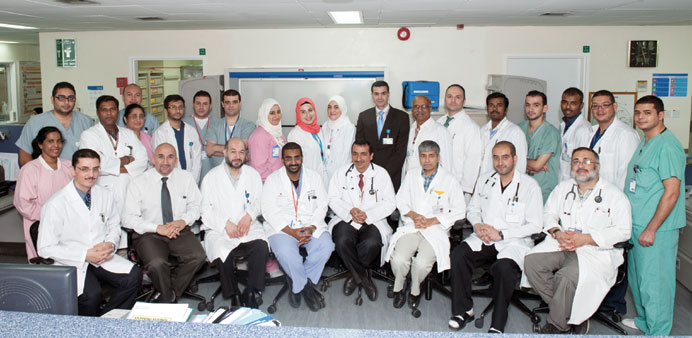|
A 49-year-old female Qatari patient being treated for H1N1 influenza at Hamad General Hospital (HGH) has recovered from a life-threatening lung infection after she was connected to a special life support device - Extracorporeal Membrane Oxygenation (ECMO). |
Due to the dedication and quick thinking of her medical team, and efficient collaboration between multiple departments at HGH, the ECMO arrived in Doha from the UK within 18 hours, saving the patient’s life.
Earlier this year, a medical team from HMC travelled to St. Thomas Hospital in the UK to receive intensive training on administering the ECMO. The training was organised in preparation for the planned implementation of the service at HMC later this year.
The ECMO treatment allows time for intrinsic recovery of the lungs and heart. It stabilises a patient’s lung function through oxygenating blood using an artificial lung outside the body; the treatment is necessary when respirator care is no longer sufficient due to lung damage. Through performing the function of the lungs, the patient is able to rest and the process of healing from infection begins.
After spending 12 days on the ECMO, the patient has recovered and is preparing to leave the hospital and return to her home and family. The ECMO service will officially open at HMC in December 2014.
The patient’s family expressed their sincere appreciation to the medical team. “After we had lost all hope, our sister is back with us now. This would not have happened without our trust in God and the medical team here at HMC. We thank them all, sincerely,” said the patient’s brother.
Dr Ibrahim Fawzy, Director of the Intensive Care Unit (ICU) at HGH, explained that great collaboration between HMC’s Medical Administration, Human Resources and Material Management Departments, along with medical staff and administration at HGH and Heart Hospital, was fundamental to the successful outcome.
“A few hours’ difference and the patient would not have survived. The trust of the patient’s family and great collaboration between our staff and multiple departments here at HMC allowed us to save her life,” said Dr Fawzy.
While the treatment is lifesaving, Dr Fawzy explained that the procedure is very dangerous and requires specialised training and close co-operation between multi-disciplinary medical teams. “The procedure sounds very similar to dialysis; however, it’s much more complicated and dangerous. Unlike the kidneys, which require 20% of the blood from the heart, the lungs require 100% of the heart’s blood. The procedure requires removing blood directly from a large vein close to the heart. It is a complicated and dangerous procedure that requires continuous monitoring. Our staff stayed to monitor her condition for many hours after their shifts ended. We were all committed to her recovery and to ensuring her safety,” said Dr Fawzy.
This complex procedure required the co-ordination of clinicians from across HMC’s network. Perfusionists, specialists trained in the use of heart-lung machines, from Heart Hospital were an essential component of the team. Dr Fawzy stressed that the successful outcome would not have been possible without the collaboration of Dr Abdulaziz al-Khulaifi, Chairman of Cardiothoracic Surgery, at Heart Hospital and perfusionists Ibrahim Musa and Abeer al-Jaja. Other departments and services, including Radiology, Vascular, the Blood Bank, the Operating Room and Anesthesia also had crucial roles in the successful implementation of the ECMO.
The medical team that treated the patient, including ECMO Nurse Lead Emad al-Momani, Primary ICU Consultant Dr Alhady Yousef and ECMO Consultants Dr Tasleem and Dr Fawzy, carefully explained the procedure and the associated risks to her family.
“They explained that there was a high chance that our sister may die while on the ECMO but that the procedure was the only way to save her life. We really appreciated their honesty and their dedication to ensuring we understood the procedure. We had high trust in their capabilities and dedication. We are very happy with the results,” said the patient’s brother.
In recent years the number of individuals diagnosed with H1N1 in Qatar has sharply declined. While most individuals infected with H1N1 will experience only mild illness and will not require medical care or antiviral drugs, some individuals, particularly those with underlying medical conditions, can develop flu complications that can be fatal.
Covering your mouth and nose with a tissue when coughing or sneezing, practicing good hand hygiene and getting the seasonal influenza vaccine are important tips for preventing the spread of H1N1.

